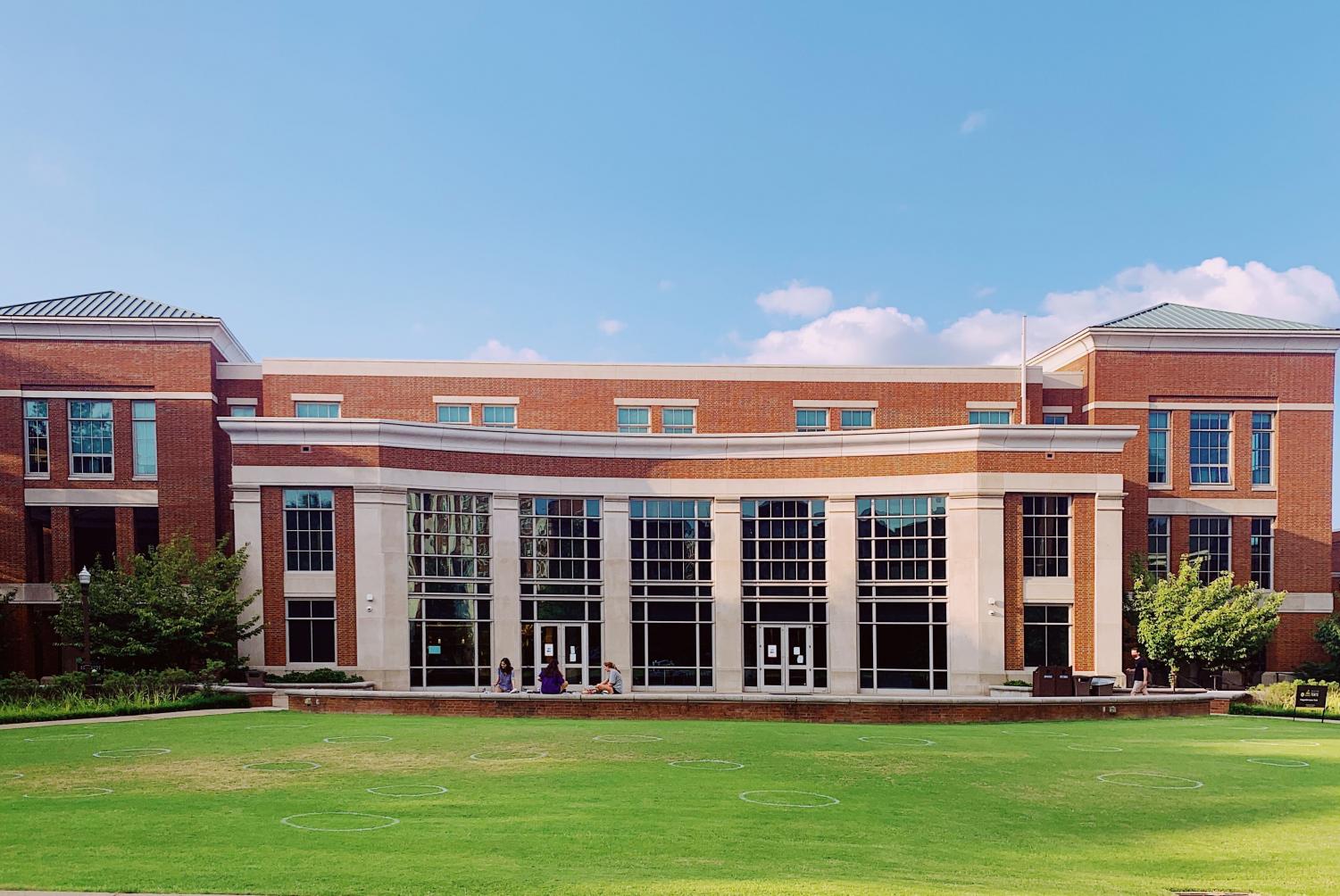
Welcome to my column, “Eat the Rich,” with me, Claire Rich. I’m a first-year planning to major in Law, History and Society with a minor in Psychology. This column will explore a series of social justice issues including race, class, gender, sexuality and so forth, and how they affect “the Vandy experience.” As a first-year, I’m constantly living, learning and growing into this campus, and will tie my new experiences into this column.
Before we delve into things, I thought I’d address the implications of my column’s name. “Eat the Rich” is commonly attributed to Jean Jacques Rousseau, a renowned political philosopher and leading figure in the French Revolution. The original quote goes like this: “When the people shall have nothing more to eat, they will eat the rich.” “The rich” that Rousseau was referring to was anyone in power. At the time, this was King Louis XVI and the rest of the aristocracy. While the monarchs led glamorous lives, the common people struggled to find moldy bread to feed their families. Ninety-eight percent of the population in France belonged to the Third Estate, the lowest class. Despite the massive size of the Third Estate, its members had little to no representation in the government. Eventually, after years of famine, malnutrition and taxation without representation, the Third Estate revolted in 1789.
The phrase made a comeback in the 21st century as income inequality in the United States has grown dramatically. According to Pew Research, “the wealth gap between America’s richest and poorer families more than doubled from 1989 to 2016.” Since the beginning of the COVID-19 crisis, Jeff Bezos alone has gained $23 billion. Meanwhile, more than 185,000 people have died and 40 million people have lost their jobs, with those under the poverty line suffering from higher mortality and unemployment rates. The phrase “Eat the Rich” has re-emerged in progressive circles as a response to these ongoing dynamics.
On social media sites such as TikTok and Twitter, the hashtag #eattherich has become increasingly popular. On TikTok, as of September 14, it has 185.3 million views. These sentiments of class struggle have also been taken to the streets through political protests. Following the death of George Floyd, protesters in Beverly Hills walked the streets chanting “Eat the Rich.” The fact that a protest for Black Lives Matter would use this phrase demonstrates its intersectionality. At the end of the day, “Eat the Rich” does not just address class struggles; it addresses the problematic yet persistent power dynamics that plague the United States.
Although our nation’s injustices may not involve moldy bread, the rhetoric of the French Revolution persists to this day. When thinking of a name for this column, I searched for a phrase that tackles the vast power inequalities I’ve observed in my time in the US. To me, “Eat the Rich” does just that. While it’s often associated with class warfare, I associate it with the empowerment of those less-privileged. This phrase represents standing up to those in power, and holding them accountable on behalf of the less fortunate. As can be seen with the protest in Beverly Hills, “Eat the Rich” gives the less-privileged the strength to fight their oppression, whether it is classism, racism, sexism or another injustice. In my mind, this is what social justice is all about.





Emilia M. • Oct 7, 2024 at 7:19 pm CDT
Very well written. There has been a movement going on since the 1970s (see Naom Chomsky’s requiem for an American Dream), to increase the power of the wealthy and decrease the power of the the average US citizens with regard to government policy. Chomsky discusses Vietnam as the flashpoint. Many wealthy people/corporations wanting it to continue and the majority of voters wanting it to end.
(I know it sounds like a conspiracy that this has been a coordinated action so look into the above yourself, while not perhaps as coordinated as implied there were wealthy interests trying to make sure they had final say to their interests in future, and not voter pressure).
Of course ‘wealthy’ – isn’t referring to your uncle or neighbor or anyone else that ‘made good’ on their dream. It’s people with extreme wealth, beyond what any normal individual could spend in many lifetimes. There’s frequently a level of sociopathy that goes with the level of extreme wealth obtained and maintained and grown, knowingly, at the expense of others. (The phenomenon is called the dark triad if I’m remembering correctly, and it’s interesting (and concerning) to read about.
I think the mistake we make in this country is to assume the government is above the uber wealthy. We live in a plutocratic republic. The wealthy dictates much to the government. Studies have been done on what laws have been enacted in the past 20 years that is citizens, the voters wanted vs. what laws had no other function than what benefited the wealthy. Laws for the wealthy represented over 70 percent of created legislation.
When confronted with failing government policies always ask who benefits.
Also who benefits by identity politics do we can not unite against those lobbying for real harm and by design not paying their fair share. Don’t be fooled by supposed philanthropic endeavors, they are PR for the wealthy, more ways to keep Alf earn money tax free. Often a pittance compared to what the average individual contributes to charitable causes relative to their own income.
Always question the ‘self made’ myth too. The wealthy love to sell that one for good PR because we love self made stories here.
(Okay off the soapbox now.)
My mom har a Rousseau text on a bedroom shelf. I clearly never cracked the spine because I didn’t know that he said ‘eat the rich’. And the historical events from which that quote was inspired.
During the age of the robber barons in the US, the reset was said to have been the Roosevelts. Theodore and more so Franklin. The kind of a reset would not be possible today because so all three branches of government are answerable to the plutocrats or oligarchs as some see it.
I think without advocacy and understanding about what had and is happening, there will never be a reset. So I see this work as very important. Because many don’t see this as the real problem. It’s weather your red or blue not the plutocracy who buy and sell everyone’s future at wholesale rates.
Angela • Aug 4, 2023 at 8:23 am CDT
I associate the term with class. You can’t have a rich poor person.
John A. Johnson • Aug 15, 2022 at 9:21 am CDT
You might have mentioned P. J. O’Rourke’s book, Eat the Rich, in this posting. I think that wealth inequality in the US is a serious problem, but it surely can’t be solved simply by taking wealth away from the rich. I’ve seen figures indicating that liquidating all of the wealth of millionaires and billionaires in the US would fund government somewhere between 4 and 8 months. It seems to me that correcting unfair wealth inequality would require a multi-pronged effort that includes reducing government inefficiency and waste, restructuring our economic system so that the rich can’t grow richer simply because they are rich to begin with, and reducing crime and improving education in poor areas of the country.
Jack Rades • Jun 19, 2023 at 7:02 am CDT
The problems may not be solved by taking the wealth away from the rich, but they certainly won’t be solved by giving tax breaks to the highest income group either. Capital gains tax protects unrealized wealth from assets; someone with millions of dollars in investments can funnel it off $100,000 at a time. And wealthy owners of businesses thrive on loans. Mr. Bezos, for instance, often takes out a signature loan in the millions of dollars, and the capital from that loan is not taxable. Taking out a tax-free loan in large amounts in the form of signature loans wouldn’t be possible without alreay having acquired millions (or billions). The non-taxable money is invested into the business, and produces millions or billions more of assets, which are non-taxable until the wealth is realized. These are the kinds of cycles that few of us are in a position to benefit from.
John Johnsons Mom • Oct 7, 2023 at 8:46 am CDT
Wow, just wow. You are in favor of taking money that someone else made that employs others, and funding a larger government. Why don’t YOU work in the direction of making more money, seeking opportunities that benefit YOU so YOU can take Your money and give it to the government instead of working at McDonald’s and demanding $20/hr which, why not make it $50?
Seems like alls well in your world if you just had all of everyone else’s money. Sounds like Socialism. If you had Socialism replacing Capitalism you wouldn’t be making anything. The state would take it all in exchange for what the state decided you get.
Al Parrish • Feb 17, 2022 at 6:40 pm CST
It was also revived by the Punk movement in the 1970s. There has always been inequality and, as long as there is, the expression will be relevant.
Ann Twiggs • May 24, 2023 at 2:43 am CDT
I woke up in the middle of the night with this phrase in my head. I used to have a Tshirt saying “Eat the Rich” in my punk rock days – I’m 74 now.
Isabelle • May 30, 2021 at 9:12 am CDT
I really like your article and wanted to let you know I’m using it as a source for my own college essay in the Florida panhandle!
Mia • May 7, 2021 at 2:31 pm CDT
?…. also, when Marie Antoinette was miss quoted – saying… “Let them eat cake”….
Then … “Eat the rich”
would be an apt rebuff
Ella • Feb 23, 2021 at 10:37 pm CST
I really enjoyed reading your article. I had been hearing the phrase and wanted more information. I appreciate the background and where the phrase originated. This article is well presented and shows the reasons behind why the phrase is becoming popular again. I look forward to reading more of your articles.
M S • Jan 27, 2021 at 5:43 pm CST
Behind every great fortune there is a crime.
rose • Apr 28, 2021 at 11:05 pm CDT
not necessarily :/
Peasant power • May 25, 2023 at 10:56 pm CDT
As we are seeing more and more. One of favorites… Jeff epstein.
Palm beach island,FL is full of rich and criminal.
Steve Monasch • Dec 8, 2020 at 12:26 am CST
I’ll bring the BBQ sauce. Yummy, but please go easy, This stuff can be toxic.
Gabby • Nov 3, 2020 at 8:26 pm CST
Claire, I love this article. It’s written extremely well, and you have an abundance of attributing evidence supporting your topic. In regards to another comment posted above, where you’re called a “hypocrite,” I strongly disagree. I applaud you for speaking your mind about this issue facing all of us in America. Perhaps you are rooted in wealth, but using your platform to speak about the downfalls of how atrocious the upper class is to America is something to be proud of. Keep up the good work, and never stop fighting!
Kaylee Ortega • Oct 17, 2020 at 3:51 pm CDT
We need to look further into the cause of this as there are currently many government leaders from different backgrounds. Well stated points.
Cya claire • Sep 28, 2020 at 3:06 pm CDT
Claire you are the definition of a hypocrite. Your points are just so hypocritical to the point where you yourself are being a racist. “Feeling bad” for the kids who “don’t have enough money for lunch” when you attend a 6-figure tuition school and come from the richest town in America is so hypocritical and you don’t even realize it. How dare you.
Steve Monasch • Dec 8, 2020 at 12:43 am CST
Cya, please be gentle, you know, honey not sandpaper…. Find common ground and then exploit that… Colonize the colonizer!
ella butler • May 3, 2021 at 12:57 pm CDT
lmao how are you gonna talk about “colonize the colonizer” when you white asf baldy
Brandon • Aug 19, 2021 at 11:56 pm CDT
Ella, are you inferring that whites cannot be poor and downtrodden? And to Cya: why are you bashing her when she clearly is recognizing the wealth gap, criticizing it, and comparing/contrasting it to the French Revolution? And “racist?” Way off-base. This article is more informative than anything else.
Louise Lawhead • Jun 21, 2023 at 3:50 pm CDT
though im aware this comment is from two years ago, i just had to share my opinion. i found this article beautifully well written. even though the hardships of poverty or racial injustice may not apply to claire, that is exactly why she is speaking out. that is literally the definition of eat the rich. spreading awareness about serious topics even though you may not be affected is what this quote is all about.
mickey • Sep 15, 2020 at 1:41 pm CDT
The more appropriate question to ask for me would be, why? Why is there this enormous disparity in power and wealth? What is the systemic root cause? Is it racism? Nooo (said shrewdly with a whimsical tone). Follow the money and the power grabs, not of corporations, but of politicians and political pundits. Look for the true root cause that has been underway for the 4 or so decades leading to this moment in time. Draw your own conclusion, then we can discuss.
Till then
Urban Mythslayer • Mar 29, 2021 at 1:21 am CDT
In the 1980s Picasso wanted to move Guernica to Spain. He wouldn’t do so until the government would guarantee three civil rights: 1. The right to vote. 2. The right to work. 3. The right to strike. How much freedom do we Americans have of these? How much do we still fight for these civil rights every day?
Brian Wilding • Jun 17, 2021 at 9:08 am CDT
Picasso died in 1973.Picasso intended that the mural ultimately reside in Spain, he refused to allow Guernica to go home as long as Franco ruled: “The painting will be turned over to the government of the Spanish Republic the day the Republic is restored in Spain!”